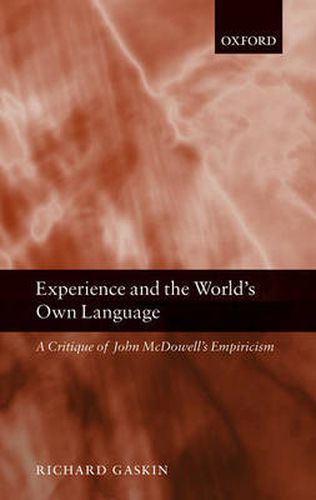Readings Newsletter
Become a Readings Member to make your shopping experience even easier.
Sign in or sign up for free!
You’re not far away from qualifying for FREE standard shipping within Australia
You’ve qualified for FREE standard shipping within Australia
The cart is loading…






John McDowell’s ‘minimal empiricism’ is one of the most influential and widely discussed doctrines in contemporary philosophy. Richard Gaskin subjects it to careful examination and criticism. The doctrine is undermined, he argues, by inadequacies in the way McDowell conceives what he styles the ‘order of justification’ connecting world, experience, and judgement. McDowell>‘s conception of the roles played by causation and nature in this order is threatened with vacuity; and the requirements of self-consciousness and verbal articulacy which he places on subjects participating in the justificatory relation between experience and judgement are unwarranted, and have the implausible consequence that infants and non-human animals are excluded from the 'order of justification’ and so are deprived of experience of the world. Above all, McDowell’s position is vitiated by a substantial error he commits in the philosophy of language: following ancient tradition rather than Frege’s radical departure from that tradition, he locates concepts at the level of sense rather than at the level of reference in the semantical hierarchy. This error generates an unwanted Kantian transcendental idealism which in effect delivers a reductio ad absurdum of McDowell’s metaphysical economy. Gaskin goes on to show how to correct the mistake, and thereby presents his own version of empiricism. First we must follow Frege in his location of concepts at the level of reference, but then we must go beyond Frege and locate not only concepts but also propositions at that level; and this in turn requires us to take seriously an idea which McDowell mentions only to reject, that of objects as speaking to us ‘in the world’s own language’. If empiricism is to have any chance of success it must be still more minimal in its pretensions than McDowell allows: in particular, it must abandon the individualistic and intellectualistic construction which McDowell places on the ‘order of justification’.
$9.00 standard shipping within Australia
FREE standard shipping within Australia for orders over $100.00
Express & International shipping calculated at checkout
John McDowell’s ‘minimal empiricism’ is one of the most influential and widely discussed doctrines in contemporary philosophy. Richard Gaskin subjects it to careful examination and criticism. The doctrine is undermined, he argues, by inadequacies in the way McDowell conceives what he styles the ‘order of justification’ connecting world, experience, and judgement. McDowell>‘s conception of the roles played by causation and nature in this order is threatened with vacuity; and the requirements of self-consciousness and verbal articulacy which he places on subjects participating in the justificatory relation between experience and judgement are unwarranted, and have the implausible consequence that infants and non-human animals are excluded from the 'order of justification’ and so are deprived of experience of the world. Above all, McDowell’s position is vitiated by a substantial error he commits in the philosophy of language: following ancient tradition rather than Frege’s radical departure from that tradition, he locates concepts at the level of sense rather than at the level of reference in the semantical hierarchy. This error generates an unwanted Kantian transcendental idealism which in effect delivers a reductio ad absurdum of McDowell’s metaphysical economy. Gaskin goes on to show how to correct the mistake, and thereby presents his own version of empiricism. First we must follow Frege in his location of concepts at the level of reference, but then we must go beyond Frege and locate not only concepts but also propositions at that level; and this in turn requires us to take seriously an idea which McDowell mentions only to reject, that of objects as speaking to us ‘in the world’s own language’. If empiricism is to have any chance of success it must be still more minimal in its pretensions than McDowell allows: in particular, it must abandon the individualistic and intellectualistic construction which McDowell places on the ‘order of justification’.